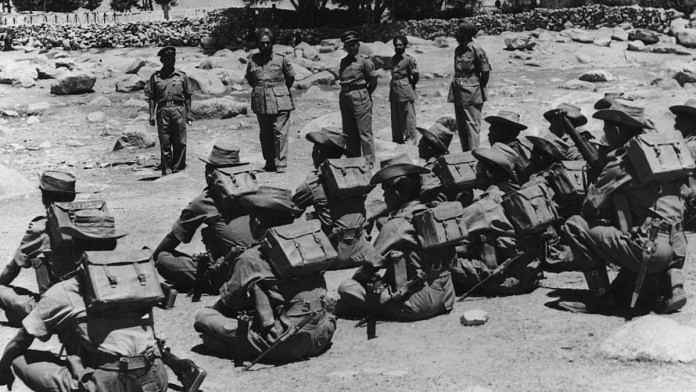India lost nearly 4,000 soldiers in the month-long war and suffered its most humiliating defeat — an event that still casts a shadow on its ties with China.
New Delhi: At the crack of dawn on this day, 56 years ago, China attacked India over multiple points across the border, leading to a month-long standoff between 10,000 to 20,000 Indian soldiers and 80,000 Chinese troops.
Unprepared for the offensive, India lost nearly 4,000 soldiers in the war and suffered its most humiliating defeat.
As India and China prepare to revive their bilateral army exercise in December, ThePrint revisits the war that shaped the complicated relationship the two Asian powers share today.
The cause
The leading cause for the 1962 war was China’s perception that India was meddling in its internal affairs in Tibet.
After Independence, India largely maintained cordial relations with China. It did, briefly, protest Chinese occupation in Tibet.
Also read: China learns lessons from Doklam, changes logistics & supply systems in Tibet
In 1954, both countries signed the Five Principles of Peaceful Coexistence, or Panchsheel. Late Prime Minister Jawaharlal Nehru started promoting the ‘Hindi-Chini bhai-bhai’ slogan around this time.
However, in March 1959, when the Dalai Lama fled Tibet and found asylum in India, People’s Republic of China leader Mao Zedong did not take it lightly. He claimed that the Lhasa rebellion in Tibet was fuelled by India. China felt that the political asylum to the Dalai Lama amounted to interference by India in China’s internal affairs.
The relations between the two countries grew increasingly tense.
The invasion
Smaller conflicts between the two countries increased in 1962. On 10 July, over 350 Chinese troops surrounded an Indian post at Chushul, Leh. Using loudspeakers, they told the Gurkha regiment to not fight for India.
And on 20 October the People’s Liberation Army invaded India in Ladakh, northern Uttarakhand and across the McMahon Line in the then North-East Frontier Agency (now Arunachal Pradesh), catching India completely off guard.
The attack began simultaneously in all sectors of the border at the same time — 5 am — synchronised as per Beijing time.
Also read: China has quietly altered its boundary with Bhutan after Doklam stand-off with India
Convinced that there would not be a war, India didn’t deploy enough soldiers, while China launched a full frontal attack.
A panicked India reportedly sought US assistance to control the Chinese aggression. Nehru wrote to then US President John F. Kennedy to provide “air transport and jet fighters” to India. But US largely stayed away.
Meanwhile, China proposed that Ayub Khan, then Pakistan President, should attack India. Pakistan chose not to.
The lessons
The war officially ended on 20 November, 1962, after China finally announced a ceasefire along the entire Sino-Indian border, even as some minor conflicts continued in NEFA and Aksai Chin.
The Sino-Indian War put the spotlight on India’s unpreparedness in a war situation and underlined the need to modernise its armed forces.
Also read: India’s misplaced priorities, shoddy planning & complacency led to 1962 war
It also highlighted the crucial strategic mistakes India committed, including not using the Indian Air Force.
On the 50th anniversary of the war, former Indian ambassador to Iraq R.S. Kalha wrote that then Chinese President Liu Shaoqi told the Sri Lankan leader Felix Bandaranaike after the war that the conflict was “to demolish India’s arrogance and illusions of grandeur”.
The Doklam standoff last year showed the situation in border areas remains a matter of concern, diplomatic or otherwise.




India learns no lessons. India covers up History that does not fit its navel gazing narrative of being a perfect Country ruled by Gods, Goddesses and their demis. Whatever happened to the Henderson-Brooks-Bhagat report? Modi is adept at repeating every policy that failed since 1945
Very surface treatment to an extremely complex issue. For example, saying that the war was caused by Chinese perception that India was interfering in Tibet is a wide broadbush. The piece appears to be an attempt at ticking a box with minimal effort.
To the contrary, it was China who learnt a lesson from Nehru! Despite Indian Army abandoning posts and running away, Jawaharlal Nehru stood like a man he was. Despite China’s threat to invade Assam if their possession of NEFA is not recognized, Nehru declined the Ceasefire and vowed to fight. By November 1962, Nehru forced China retreat to pre-war positions and recovered every inch of NEFA lost by the Army. China never claimed victory nor even acknowledges any war ever taking place. When enemy retreats, any other nation would claim victory while only Indians can INSIST of “defeat, debacle and humiliation”. India however DID NOT learn any lesson. Even with 56-year hindsight, all that Indians want to do is smear Nehru in the name of but fail to even get their story straight. One theory goes that Nehru was too naive and trusted Chinese who “betrayed” him unscrupulously. The other theory is that Nehru was abrasive in challenging the borders and hence China came down and taught him a lesson. Both these theories are mutually contradictory. If one is true, the other cannot be! So which is the truth? Was Nehru Naive? or was Nehru Abrasive? Ironically, the objective of both theories is to insult Nehru and laugh at his supposed misfortune!
It was a rape which has to be settled on way or
Other
Sooner or later
Loves to all